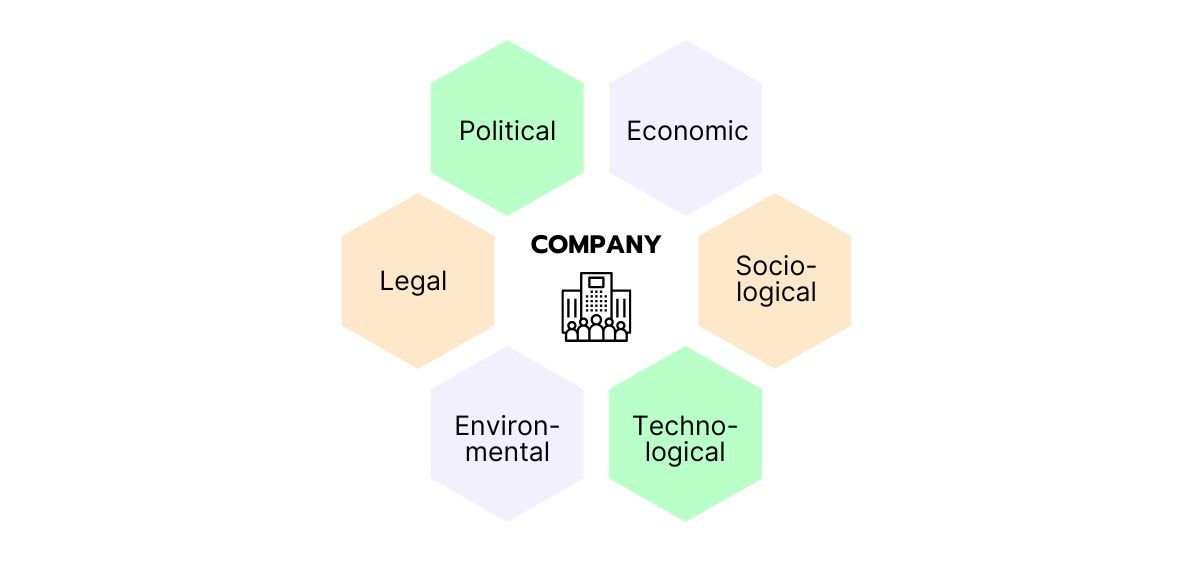The PESTEL analysis is an important tool for understanding a company’s external environment. It examines political, economic, sociological, technological, environmental, and legal factors. In consulting, the PESTEL analysis helps identify opportunities and risks that can influence your strategic decisions. This allows you to provide informed recommendations and give clients a better understanding of market conditions.
In this article, we’ll take a closer look at the PESTEL analysis and explain its six key components. We’ll also demonstrate how this tool can be applied to the consulting industry, along with a practical example. 🔎💡
The Key Components of the PESTEL Analysis
To better understand the PESTEL analysis, let’s examine each element in detail. Every component plays a crucial role in how companies adjust their strategies and respond to external factors. Here are the six key components you should consider:

- Political factors: These include the political environment, such as government policies, regulations, and political stability. These can present both opportunities and risks. Consultants use this information to prepare clients for potential political changes.
- Economic factors: Economic factors relate to the economic environment, including growth rates, inflation, and interest rates. Consultants analyze these aspects to help clients identify market trends and make strategic decisions.
- Sociological factors: Sociological factors focus on cultural and societal aspects that influence consumer behavior, such as demographic changes and social values. Consultants use these insights to help clients adjust their marketing strategies.
- Technological factors: These refer to innovations that impact organizations, such as digitalization and new technologies. Consultants help their clients find innovative solutions to improve efficiency.
- Environmental factors: Environmental factors deal with issues like climate change and sustainable practices. Consultants assist companies in developing eco-friendly strategies to meet societal expectations.
- Legal factors: Legal factors include the regulatory framework businesses must comply with, such as labor laws and consumer protection. Consultants help clients identify legal risks and ensure their strategies are compliant.
These six components of the PESTEL analysis provide valuable insights into the external forces affecting companies. With this knowledge, you can base strategic decisions on solid information and better respond to market changes.
Applying the PESTEL Analysis – E-Mobility Case
To demonstrate how the PESTEL analysis is used in consulting, here’s an example case:
👉 E.ON Inhouse Consulting Case: E-Mobility
The city of Essen is partnering with E.ON, a leading provider of sustainable energy solutions, to accelerate its transition to renewable energy and meet its ambitious climate goals. Below is the PESTEL analysis that evaluates the key factors for developing sustainable energy infrastructure in Essen:
- Political: Germany’s political support for sustainable energy initiatives is strong, both at the national and local levels. The newly elected mayor of Essen is committed to green policies, aligning the city's ambitions with national goals for reducing carbon emissions.
- Economic: Essen’s solid economy allows for investments in sustainable energy infrastructure. Key factors include financing options, subsidies for renewable energy projects, and the potential economic benefits of reducing energy costs and creating green jobs.
- Socialogical: There is growing public awareness about climate change in Essen, and citizens are becoming more receptive to eco-friendly energy solutions. Public engagement and education will be crucial for gaining widespread support for the city’s green initiatives.
- Technological: Technological advancements in renewable energy, smart grids, and energy storage provide E.ON with opportunities to implement efficient, innovative solutions in Essen. Integrating digital technologies will be key to optimizing the city's energy use.
- Environmental: Essen aims to significantly reduce its CO₂ emissions, making renewable energy projects such as solar and wind farms essential. Promoting electric vehicles and sustainable public transportation can further help the city achieve its climate targets.
- Legal: E.ON must comply with national and EU regulations related to renewable energy and carbon reduction. Legal frameworks offer incentives and subsidies for clean energy projects, which can support the transition.
This analysis helps E.ON and Essen identify the opportunities and challenges in achieving the city’s ambitious climate goals through sustainable energy solutions.
Check out more cases on topics like sustainability, new products, or market analysis in our case library! 💼✨
Did You Know That? 💡
The PESTEL analysis can be combined with other tools to get a more comprehensive view of a company’s environment. For example, the SWOT analysis complements the PESTEL analysis by focusing on internal strengths and weaknesses, and relating them to external opportunities and risks identified by PESTEL. Similarly, Porter's Five Forces analysis can help understand the competitive environment and further explore external threats and opportunities.
Key Takeaways
- The PESTEL analysis is an essential tool for consultants to understand the external factors shaping industries and organizations.
- By analyzing political, economic, socialogical, technological, environmental, and legal factors, consultants can provide valuable insights that help clients make informed decisions and drive strategic success.
- The PESTEL analysis can be effectively combined with other tools like the SWOT analysis to get a complete picture of market conditions.
- For graduates pursuing a career in consulting, mastering the PESTEL analysis is valuable for helping clients succeed in an ever-changing business environment.

